 As a middle-aged mother, with struggling children, it was hard to believe in anything but the dissolution of my family. I felt like a failure. My family didn’t look anything like I planned. Where were the calm and peaceful nights sitting around the fireplace popping corn? Where were the bedside chats filled with laughter and love? Where were the days of working and playing together?
As a middle-aged mother, with struggling children, it was hard to believe in anything but the dissolution of my family. I felt like a failure. My family didn’t look anything like I planned. Where were the calm and peaceful nights sitting around the fireplace popping corn? Where were the bedside chats filled with laughter and love? Where were the days of working and playing together?
These are the things that I envisioned as a young woman. But to have these impossible things I needed to understand that they didn’t just happen because we were a family. They would happen as I connected to my children multiple times a day; as I spent time and was present as we ate together, played together, worked together; as I listened.
I lacked many of those skills. Worse, I didn’t even know I needed them. I assumed that getting married, having kids and taking care of them and my home was all I needed to do. It was a shock when the whole thing was harder than I anticipated; when I realized I didn’t know what I was doing; when I understood that connection required touching, being together and listening. None of this came naturally to me.
I share the fact that I contemplated suicide
because I know I’m not the only one who has felt despair, who has believed that the impossible couldn’t happen.
But I, like the queen, kept believing in the impossible. I got up day after day determined to hold it together; determined to hold on to my family. I searched for what would make a difference. I found resources and support along the way. I worked to change. I practiced when it was darn hard. Even though I occasionally checked out, I always checked back in and hung on. I kept believing that if I didn’t give up, if I changed, learned, and grew, my family was possible.
Interestingly, the mistakes we make, and the trials of our parenting are sometimes the very things that, in the end, bind our family together. That’s what happened to us. Because none of us gave up, because we kept believing in impossible things, impossible things happened. Impossible things are still happening in our family. My 45-year-old son just graduated from college. His story is one of believing in the impossible.
All seven of my children are wonderful, growing adults. They’re loyal, generous, kind and connected to each other and to Don and me. They all have challenges because that is life. In their families they deal with sexual identity issues, blindness of a spouse, not finding a spouse, unable to have children, special needs kids, divorce, faith crisis, depression, learning difficulties, getting more schooling, etc.
Each day as I kneel to pray, I talk with God about all the impossible things our family needs and I believe they can happen. On my bedroom wall are pictures of the impossible things I long and work for. I believe in the impossible because I have seen the impossible become reality.
My youngest daughter’s childhood icon was Audrey Hepburn. Maybe it’s because she looks like her. Audrey Hepburn was a wonderful actress but her true greatness came later in life as she tackled impossible things as a humanitarian. She worked in some of the poorest communities of Africa, South America, and Asia. She said, 
I know it can be hard as you build your family. I know that sometimes it feels like a failure, you feel like a failure. I know that you don’t always have what you need, but if you hang on, give up blame and victimhood, and work to grow and change, then nothing is impossible. In the words of Robert Schuller, “The only place where your dream becomes impossible is in your own thinking.”
Be like the Queen, start every day thinking about the impossible as if it is possible.



 During the years that my family lived in ID. my dad was an over the road salesman. He bought a Cadillac and I hated that car. Every time we drove to my grandparents’ home in Afton, WY., with all the kids packed in the back seat, I would ruminate on my dad’s selfishness in buying such a stupid car for such a large family. Why didn’t we have a station wagon?
During the years that my family lived in ID. my dad was an over the road salesman. He bought a Cadillac and I hated that car. Every time we drove to my grandparents’ home in Afton, WY., with all the kids packed in the back seat, I would ruminate on my dad’s selfishness in buying such a stupid car for such a large family. Why didn’t we have a station wagon?
 Do you recall the White Rabbit in Lewis Carrols, Alice in Wonderland? You know the jumpy little guy who was always crying out, “I’m late, I’m late, for a very important date.” He was so worried about being in the right place at the right time. He had so much on his plate.
Do you recall the White Rabbit in Lewis Carrols, Alice in Wonderland? You know the jumpy little guy who was always crying out, “I’m late, I’m late, for a very important date.” He was so worried about being in the right place at the right time. He had so much on his plate.


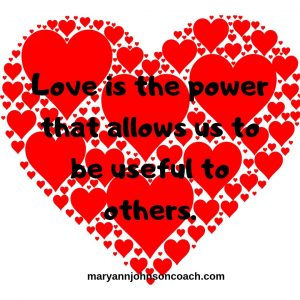
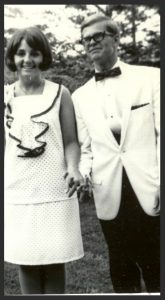 I’ve been married to the same man for 48 years. We celebrated this milestone in May of 2019. This has caused me to pause and contemplate the last fifty-one years. That’s how long I’ve known my husband, Don. I fell in love with him because he was handsome and romantic. One day he showed up at my door with a car full of roses. He had cleaned out a street vendor! But that isn’t why I’ve stayed with him.
I’ve been married to the same man for 48 years. We celebrated this milestone in May of 2019. This has caused me to pause and contemplate the last fifty-one years. That’s how long I’ve known my husband, Don. I fell in love with him because he was handsome and romantic. One day he showed up at my door with a car full of roses. He had cleaned out a street vendor! But that isn’t why I’ve stayed with him. me. He often goes out of his way to do something he knows I need to have done. He looks at me when I am talking to him. He takes the time to listen. He doesn’t always get what I am saying but he listens and tries. : ) He often puts his needs ahead of mine.
me. He often goes out of his way to do something he knows I need to have done. He looks at me when I am talking to him. He takes the time to listen. He doesn’t always get what I am saying but he listens and tries. : ) He often puts his needs ahead of mine. There is a space between stimulus and response. Sometimes it’s so narrow that you would swear it isn’t even there. But it is and you can learn to recognize the moment of choice. You will still respond poorly for a time, but eventually, that space between stimulus and response will get wider and you will have time to choose a better response. I promise this is true!
There is a space between stimulus and response. Sometimes it’s so narrow that you would swear it isn’t even there. But it is and you can learn to recognize the moment of choice. You will still respond poorly for a time, but eventually, that space between stimulus and response will get wider and you will have time to choose a better response. I promise this is true!
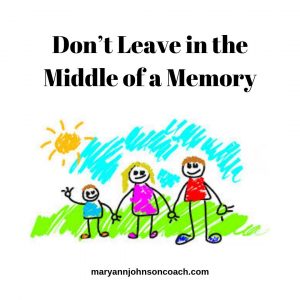

 One of my sisters decided to finish her basement and hired another sister and her husband to do the job. It’s important to know that they aren’t contractors but thought they could do the job. My sister, Nanette, went to Google to learn how it was done. She estimated that it would take them about two weeks.
One of my sisters decided to finish her basement and hired another sister and her husband to do the job. It’s important to know that they aren’t contractors but thought they could do the job. My sister, Nanette, went to Google to learn how it was done. She estimated that it would take them about two weeks. whether my sister should have said yes. It’s more a question of what my sister wanted.
whether my sister should have said yes. It’s more a question of what my sister wanted.
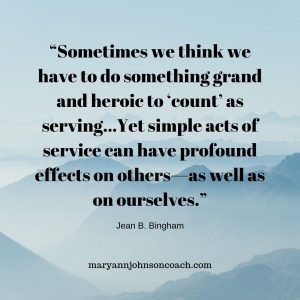


 There’s a tree in our back yard that is growing faster on one side than on the other. The other morning my daughter gave me her impression as to why this tree is so lopsided.
There’s a tree in our back yard that is growing faster on one side than on the other. The other morning my daughter gave me her impression as to why this tree is so lopsided. we could I built garden boxes for my patio and I’ve tended them with loving care. I feed them and I prune them. I deadhead the flowers every day, so they’ll keep blooming. I water. I am consistent.
we could I built garden boxes for my patio and I’ve tended them with loving care. I feed them and I prune them. I deadhead the flowers every day, so they’ll keep blooming. I water. I am consistent.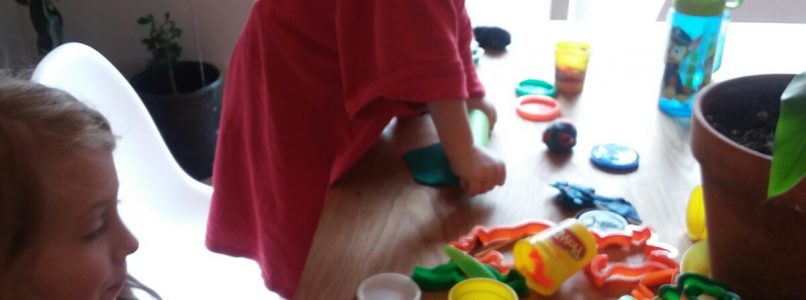
 comes with summer. BUT summer can be a very busy time. Sometimes the pace outstrips my ability to keep up.
comes with summer. BUT summer can be a very busy time. Sometimes the pace outstrips my ability to keep up. the winter with the free range chickens. Then totally covered over early spring until the chicken run was done and they were contained.
the winter with the free range chickens. Then totally covered over early spring until the chicken run was done and they were contained. 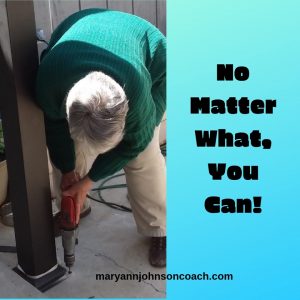
 daughter’s family. New babies are so wonderful! I helped them landscape the front yard. Whew, that was a lot of work. They waited until I got there because they had this idea that I know a lot about plants, how they grow, how to design gardens, etc. Yikes! It was a real adventure at the greenhouse picking everything out. It was an even greater adventure designing and planting everything. However, it turned out great and we got some good together time in the bargain.
daughter’s family. New babies are so wonderful! I helped them landscape the front yard. Whew, that was a lot of work. They waited until I got there because they had this idea that I know a lot about plants, how they grow, how to design gardens, etc. Yikes! It was a real adventure at the greenhouse picking everything out. It was an even greater adventure designing and planting everything. However, it turned out great and we got some good together time in the bargain.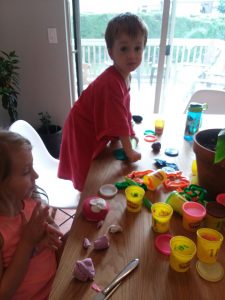 front door. The kids LOVED that. I learned all about play dough and the wonderful things that kids can create. : ) Then we moved on to bubble snakes. We also built and exploded a volcano because Elliott like everything prehistoric.
front door. The kids LOVED that. I learned all about play dough and the wonderful things that kids can create. : ) Then we moved on to bubble snakes. We also built and exploded a volcano because Elliott like everything prehistoric.